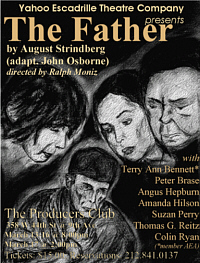
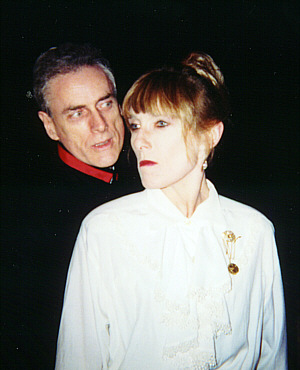 Strindberg's The Father is about an army captain, Adolf
(Angus Hepburn) and his wife, Laura (Terry Ann Bennett). She
expertly manipulates him into doubting whether their daughter, Bertha, is his,
a suggestion that drives him over the edge into insanity. She also manipulates
her brother (the local pastor) and the new doctor into thinking that the
captain's obsession with his daughter's paternity is a sign of insanity,
thus setting him up to be committed.
Strindberg's The Father is about an army captain, Adolf
(Angus Hepburn) and his wife, Laura (Terry Ann Bennett). She
expertly manipulates him into doubting whether their daughter, Bertha, is his,
a suggestion that drives him over the edge into insanity. She also manipulates
her brother (the local pastor) and the new doctor into thinking that the
captain's obsession with his daughter's paternity is a sign of insanity,
thus setting him up to be committed.
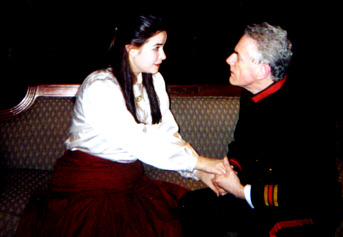 Adolf responds to Laura's attack with
the facts of a Victorian-era man's role in society: a woman gives up her
rights when she marries, in exchange for a man's protection. (He also
threatens to kill himself if she pushes the insanity argument, thereby doing
her out of the life insurance.) It is a battle between Olympic-class fencers
that turns Who's Afraid of Virginia Woolf? into a sandlot argument.
Adolf responds to Laura's attack with
the facts of a Victorian-era man's role in society: a woman gives up her
rights when she marries, in exchange for a man's protection. (He also
threatens to kill himself if she pushes the insanity argument, thereby doing
her out of the life insurance.) It is a battle between Olympic-class fencers
that turns Who's Afraid of Virginia Woolf? into a sandlot argument.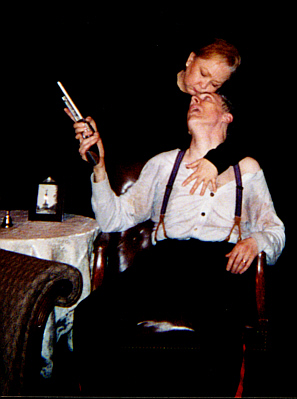 Hepburn and Bennett's performances were a clinic on the eternal question, what
is good acting? These two were not only listening closely to each other, they
were constantly alive to a cauldron of thoughts bubbling in their own minds.
Amanda Hilson, too, as their daughter, showed an astute combination of
innocence, forwardness, and misguided loyalty in a perfectly cast role.
Suzan Perry, as the old, religion-crazed nanny, Margaret, was also
perfectly cast, as a black-draped, Bible-toting Cabbage Patch doll, though
she didn't have the fire and energy of the two principals. Colin Ryan
showed a pleasing aspect as the pragmatic young guardsman Nöjd whose
possible impregnation of a maid starts the play off. Thomas G. Reitz
and Peter Brase as the pastor/doctor duo were less successful at
infusing their characters with spontaneity and variety.
Hepburn and Bennett's performances were a clinic on the eternal question, what
is good acting? These two were not only listening closely to each other, they
were constantly alive to a cauldron of thoughts bubbling in their own minds.
Amanda Hilson, too, as their daughter, showed an astute combination of
innocence, forwardness, and misguided loyalty in a perfectly cast role.
Suzan Perry, as the old, religion-crazed nanny, Margaret, was also
perfectly cast, as a black-draped, Bible-toting Cabbage Patch doll, though
she didn't have the fire and energy of the two principals. Colin Ryan
showed a pleasing aspect as the pragmatic young guardsman Nöjd whose
possible impregnation of a maid starts the play off. Thomas G. Reitz
and Peter Brase as the pastor/doctor duo were less successful at
infusing their characters with spontaneity and variety.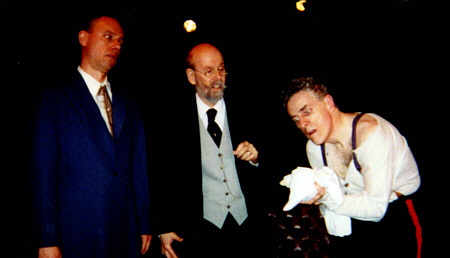 The play, on reading, seems impossible: a man goes out in the snow on an errand
and comes back mad. The success of the huge dramatic arc gives credit not only
to the actors but to director Ralph Moniz. Every recurrence of the thematic
material was pointed up, and the pace was usually breathtaking (a bit too much
so at the end, when opening-night jitters apparently took over). John Osborne,
the original Angry Young Man, subtly modernized the script without detracting
from its 1887 roots (it played as if written yesterday).
The play, on reading, seems impossible: a man goes out in the snow on an errand
and comes back mad. The success of the huge dramatic arc gives credit not only
to the actors but to director Ralph Moniz. Every recurrence of the thematic
material was pointed up, and the pace was usually breathtaking (a bit too much
so at the end, when opening-night jitters apparently took over). John Osborne,
the original Angry Young Man, subtly modernized the script without detracting
from its 1887 roots (it played as if written yesterday).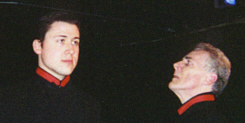
Box Score:
Writing: 2
Directing: 2
Acting: 2
Set: 1
Costumes: 2
Lighting/Sound: 0
Copyright 2002 John Chatterton